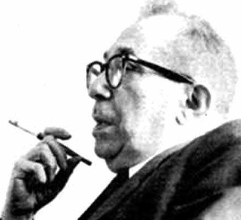
cross-referenced news and research resources about
Leo Strauss
Leo Strauss, a refugee from Nazi Germany who arrived in the United States in 1937, was trained in the history of political philosophy, and became one of the foremost conservative emigre scholars. He taught at the University of Chicago.
He was widely known for his argument that the works of ancient philosophers contain deliberately concealed esoteric meanings whose truths can be comprehended only by a very few, and would be misunderstood by the masses. This has come to be known as the hidden meaning thesis. Similar arguments hae been made by Hakim Bey regarding Chinese writings associated with Tongs.
Other elements of the philosophy of Strauss are controversial, with ideals that seem to go contrary to democracy. According to an analysis by Jim Lobe for the Inter Press Service News Agency, Strauss believed the world to be a place where policy advisers may have to deceive their own publics and even their rulers in order to protect their countries.
|

Leo Strauss
|

|
updated Thu. February 15, 2024
-
The American Conservative
March 20, 2018
Though many scholars—from Daniel Boorstin to Leo Strauss to Peter Stanlis—were also re-discovering Burke (along with Alexis de Tocqueville) in the 1940s, it was Kirk's 1953 work, The Conservative Mind, that would once again make Burke a household name in America and, to a lesser extent, in GreatÃâà...
Claremont Courier
March 16, 2018
His books include Natural Rights and the New Republicanism, The Natural Rights Republic, Launching Liberalism, and Leo Strauss and the Problem of Political Philosophy. He is now completing a book titled A Nation so Conceived: Abraham Lincoln and the Problem of Democratic Sovereignty.
Patriot Post
March 9, 2018
Which of course is the whole point, especially because our fictional observer likely would agree with Leo Strauss, a German-American who in 1953 expressed astonishment about how a country “defeated on the battlefield … deprived its conquerors … of victory by imposing on them the yoke of its ownÃâà...
Daily Maverick
March 8, 2018
Interestingly, there are interesting echoes of this approach in the realpolitik school of history and international relations, as exemplified by people like Leo Strauss and Henry Kissinger, along with a whole roster of diplomatic practitioners such as Otto von Bismarck and Charles Talleyrand. By contrast, theÃâà...
The Intercept
March 7, 2018
... I carry the cross as a Christian for antidisestablishmentarianism, until the seeds of despotism arrested my vision, lyricism with cynicism and syllogisms, until they Pedro Albizu Campos and kill me in prison, chem trail conditions, stem cells of Leo Strauss's philosophy, the birth of neo-con policy, but I laughÃâà...
lareviewofbooks
March 3, 2018
Reading the film in the way Leo Strauss read Plato's and Spinoza's work, as well as Milton's Paradise Lost, we can recover this apparently foreclosed potential. A careful Straussian reading draws attention to signs that indicate that the obvious hierarchy of theoretical positions has to be inverted.
Mosaic
March 1, 2018
Or, to come at the same question from another angle, what if Greene's admiration for those Jewish martyrs in 17th-century Poland amounted to nothing more than what the philosopher Leo Strauss, in a similar context, would call a “heroic delusion”? An average Jew on the street might make do with aÃâà...
Houstonia Magazine
February 16, 2018
Where do you even start with the weather this week? On second thought, let's not, because trying to make sense of the roller coaster that is Houston weather will just make your head spin. You survived National Pizza Day, Fat Tuesday and Valentine's Day, but National Margarita Day approaches. Good luckÃâà...
Mercer News
December 31, 1999
... 1994), The Natural Rights Republic (University of Notre Dame Press, 1997), Launching Liberalism: John Locke and the Liberal Tradition (University of Kansas Press, 2002) and co-author of The Truth about Leo Strauss: Political Philosophy and American Democracy (University of Chicago Press, 2006).
|
news and opinion
|
|
|
leo strauss
Neo-Conservative:
leo strauss
|
|